
Your Team is Stressed. Gratitude Leadership Can Help!
Gratitude leadership is a way to help reduce the stress your team is experiencing.
Here in the United States, the Thanksgiving holiday is hitting a little differently this year. Compared the what we’ve experienced so far in 2020, the normal holiday stress seems non-existent.
As we celebrate the US holiday either virtually, in smaller groups, or maybe even take our dinner outdoors, one thing that’s certain is that we all deserve an appreciative pat on the back (and a nice long weekend break!)
That’s where gratitude leadership comes into play. It may be one of the most powerful tactics in your arsenal to combat stress. For overwhelmed nonprofit staff and volunteers, it can be an amazing coping strategy. Consider my experience with a sports injury.
Getting Injured Sucks
Around this time last year, I sprained my ankle playing soccer. After a few days on crutches, my dreams of a quick recovery slowly faded into a tearful sunset. It was pretty severe.
For two weeks, I hobbled throughout the house, waking to extreme pain as the blood rushed to my ankle each morning as I climbed out of bed. My arms were weak, and because I’ve gained weight in recent years, I could barely hold myself above my crutches. Navigating the stairs in our house was a nightmare with my walking sticks, with the risk of a gnarly tumble if I slipped.
After two weeks on the couch, the swelling in my ankle persisted. An orthopedist put me in a walking boot and prescribed physical therapy. It would be at least another month before things would be close to normal.
Gratitude Helped
In my frustration, I remembered how I had weathered tough times in the past. I knew that my reality was really determined by my own outlook. And, I had some choices to make.
So, I chose gratitude and began to list the things I was thankful for…
- I had health insurance
- I had a caring husband to help out
- My injury was temporary
- I only had one set of stairs to climb up and down
- I empathized even more with the struggles my friends with disabilities had to endure
- I worked from home, so I could keep earning while I was incapacitated
- I had a laptop computer, so I could work while my foot was up
- My friendly kitty cat kept me company
- My injury taught me patience and gave me more respect for the limits of a middle-aged body
- I was now more inspired than ever to get back to the gym and get fit
And, an amazing thing happened. My frustration evaporated. I quit fighting my current reality and became focused on my recovery.
Things began to flow. Every time I found myself slipping into old thoughts, I started my list again. And, my injury had valuable lessons for me, yet another thing to be grateful for.
Eventually, the swelling is down, the boot came off, and I’m now back to 100%.
Make Gratitude Leadership Work for You
Nonprofit staff must meet incredible demands. Our work, though often maligned as less than the outputs of private industry, is not for the faint of heart.
We must juggle the priorities of multiple constituencies. We must squeeze results out of every drop of meager resources we are afforded. We must cope with the crises, both small and large, of the people we serve.
We must keep our chins up and lead even when things are at their worst. And, we must continue to hope for the changes we wish to see in the world.
It’s a tall order and it’s so easy to get burnt out and frustrated. But, there’s an upside — you have the power to change your point of view.
Next time you or your team is feeling down, try gratitude. Make a list of what you are thankful for. Then, make that list your personal mantra. Bring it up any time you find yourself slipping into old thought patterns.
By turning things on their head, you’ll be amazed at what happens. Resistance will be transformed into resilience, and you’ll begin to see new opportunities for yourself and your team. You’ll see your morale go from low to light overnight. It may sound corny, but give it a try.
It really does work.
Why You Need to Appreciate Volunteers
To genuinely appreciate volunteers, we must go beyond plaques, pins, certificates, and giveaways. Gratitude leadership involves deep listening and honoring the true needs of volunteers.
Unfortunately, executive leaders sometimes don’t readily see the value of investing resources (time + money) into anything beyond trinkets that have little meaning.
So, go over these two research-based reasons with your bosses when they simply think you’re a nice person, and you need to convince them volunteer appreciation is indispensable. (Reason #2 will be the most compelling to them.)
You’ll learn how to successfully carry each reason to completion.
Reason #1: Basically… it’s Expected of You
Ok, you knew this reason, but that doesn’t help you tackle it. You want to appreciate the true needs of your volunteers, but many of their expectations are never verbally expressed.
Psychological Contract theory can help.
What are Psychological Contracts?
When we receive, we expect to repay. This is deeply ingrained into our instincts as humans and is also an important part of our social fabric.
Volunteer appreciation aligns with the existing social norms of reciprocity, affirms life’s goodness through the example of service, and communicates the organization’s humble dependence on others.
Much of our expectations in the work (and volunteer) world are based on promises we think others have made to us. These are known as psychological contracts (PC), and they represent the mutual beliefs, perceptions, and informal obligations between an employer and an employee (or volunteer).
They set the dynamics for the relationship and can include both the implicit “unwritten” and explicit “clearly expressed” promises. They rest on the notion of reciprocity.
For example…
An explicit promise might be that an organization will provide five hours of expert training to volunteers.
An implicit promise by a volunteer might be that they will be loyal to the organization and not speak poorly about them in public.
Consequences of a Breach
Unfortunately, psychological contracts are created in the mind and almost never expressed. This causes friction between volunteers and paid staff as expected “promises” go unfulfilled, which is known as a breach.
When unchecked or rectified, breaches can mean perceived promises aren’t kept, which leads to negative emotions, which in turn leads to a perceived violation or slight, which can then result in decreased job satisfaction, commitment, and ultimate performance. A breach can be experienced by both volunteers and paid staff, creating a vicious cycle of discontent.
That’s why it’s imperative to appreciate volunteers by understanding and surfacing expectations.
How to Appreciate Volunteers by Mapping Psychological Contracts
Mapping expectations is one way to begin to understand the hidden dynamics within each of your volunteers. This will also help leaders better appreciate volunteers and understand how to recognize and reward them by directly meeting needs.
Use the quick grid below to brainstorm the explicit and implicit promises you believe make up the psychological contracts of your volunteers and co-workers. To get you started places the examples below in under explicit or implicit.

You can use the data you gather when mapping psychological contracts to take your appreciation of volunteers a step further:
Use it to remind volunteers about the organization’s expectations
Honor volunteers tenure or commitment to the cause
To meet large-scale goals by offering quick, “transactional” incentives
Beyond simply that it’s “the right thing to do,” learning to appreciate your volunteers daily can directly impact your organization’s bottom line.
Reason #2: To Build You Nonprofit’s Capacity
Ah, that sounds more like music to your Executive Director’s ears. Simple expressions of gratitude have been shown to directly affect:
-
- Motivation
- Productivity
- Morale
- Retention
- and, Results
Gratitude leadership also helps employees (and volunteers) see beyond a disaster or failure and recognize their gains. This is good news for nonprofits who must address complex challenges every day.
Robert Emmons, an expert on gratitude and professor at UC Berkeley, argues that gratitude gives teams a tool “to transform an obstacle into an opportunity,” and reframe a loss as a potential gain. Volunteer appreciation can actually help us become more resilient even in tough times.
“Gratitude builds up a sort of psychological immune system that can cushion us when we fall….There is scientific evidence that grateful people are more resilient to stress, whether minor everyday hassles or major personal upheavals,” he notes.
In addition, researchers have found that giving thanks lowers daily aggression, hurt feelings, and overall sensitivity. In fact, an activity as basic as writing a letter or mentally counting your blessings once a week has been shown to decrease aggression.
Gratitude also increases the effectiveness of decision making by increasing levels of patience.
Get Buy-In for Volunteer Appreciation & Gratitude Leadership
So, the next time you get push back on your proposal to recognize volunteers and board members, share the evidence. Then, link it back to your agency’s goals.
Check out the following research studies:
- A Grateful Heart is a Nonviolent Heart: Cross-Sectional, Experience Sampling, Longitudinal, and Experimental Evidence
- Gratitude: A Tool for Reducing Economic Impatience
- A Little Thanks Goes a Long Way: Explaining Why Gratitude Expressions Motivate Prosocial Behavior
Is volunteer appreciation worth the investment? You be the judge.
How to Give Volunteer Gifts that Actually Mean Something
If you’re like most organizations that rely on volunteers, you naturally want to show your gratitude with small volunteer gifts or tokens of appreciation.
But, do the volunteers really use what you give them? Do they value these gifts, or do they just end up in the storage closet (or worse, the trash!) and easily forgotten?
When we give gifts, we want them to be meaningful. We want the recipient to understand the care behind it.
Volunteer gifts should reflect that sentiment, but with one key difference.
When it comes to rewarding our supporters through gratitude leadership, we also want to do it strategically.
As thoughtful managers, we need to consider what will have the most impact.
Leaders of volunteers are the “Chief Momentum Officers” of their organizations, and volunteer appreciation can be a key management tool for them.
Why Give? It’s Expected and Meaningful
There are two main management-based reasons to show gratitude to volunteers and board members.
One is to fulfill the social contract. As a human race, we have well-established social norms of reciprocity. In other words, if someone does something for you, then you feel obligated to return the favor. This give and take is deeply ingrained in our DNA and has helped us survive as a species.
Thanking others also has existential meaning. It is an affirmation of life’s goodness and triggers the expectation that good things will continue.
For organizations, giving thanks also indicates our humble dependence on others, in this case on community members that in many situations, organizations simply can’t do without.
Two Key Reasons for Volunteer Appreciation
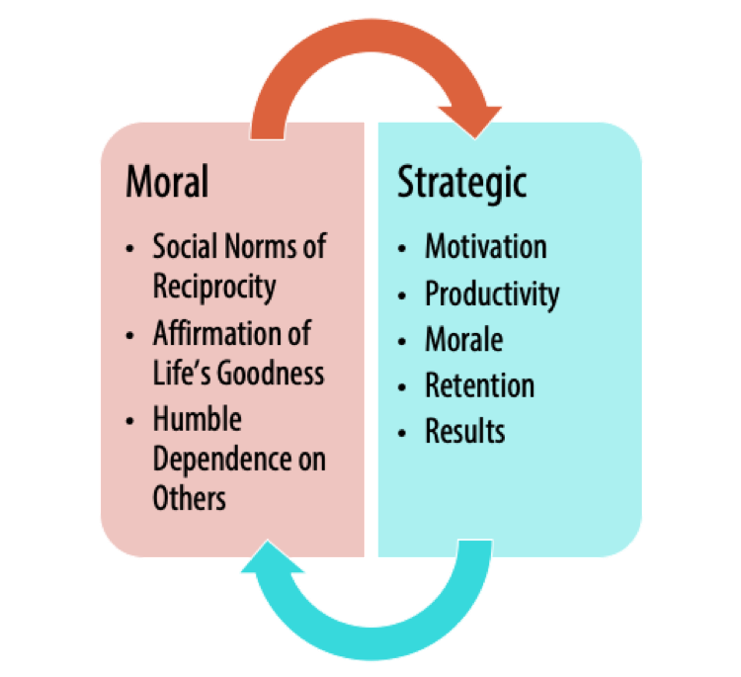
Another justification for acknowledging volunteers is that volunteer appreciation helps managers meet the strategic goals for their organizations.
Volunteer recognition helps clearly acknowledge when volunteers have followed through on their commitments and offers clear social proof for others.
This kind of positive reinforcement feels good for everybody, and it promotes prosocial behavior in kind.
It is also a way to remind volunteers about the expectations and future gains to be achieved through healthy collaboration.
Volunteer appreciation can honor a volunteer’s tenure by offering tangible, extrinsic rewards. Rewards can also be directly aligned with ongoing program or agency-wide goals.
(Note: To dig deeper into how you can better implement recognition strategies at your nonprofit, check out this in-depth Volunteer Appreciation guide).
Volunteer Gifts with Deeper Meaning
So, we know intrinsic motivation has a lasting impact, but that doesn’t mean extrinsic ones can’t be imbued with deeper meaning.
Here are some ideas on how to give volunteer gifts that have a real impact. (You’ll notice they go hand in hand when the ones we’ve covered already.)
-
- Encourage Mastery
- Give books that help them learn and master new skills related to their service
- Reward volunteers with special access to in-service training that is generally reserved for paid staff only
- Give volunteers tickets to local personal development events and conferences
- Provide Autonomy
- Give volunteers thumb drives loaded with key training and program materials
- Offer bus passes for volunteers who need help getting to their service sites
- Print special clipboards and lanyards for volunteer leaders that show they are in charge
- Reinforce Purpose
- Give a donation to another organization on behalf of a volunteer
- Give a photo album full of pictures of volunteers and staff along with quotes from people they have served
- Provide general gifts with inspirational messaging
- Cultivate Relatedness
- Award volunteers who have completed their orientation training and their first shift with a t-shirt that lets them know they’re an official “insider”
- Reward volunteers with badges they can attach to their name tags that show what special project teams they belong to
- Give boxed “kudos cards” they can give to fellow volunteers and paid staff to create a culture of gratitude
Make Someone’s Day with a Kudos Card

The premise of the kudos cards is simplicity and meaning. Keep a box of index cards and draw a smiley face (or thumbs up, or whatever you want) on it. When you’ve noticed a volunteer do something great, immediately write one quick sentence of your appreciation underneath the smiley face. Put it somewhere they will find it.
This quick reward system is small, yet meaningful enough, that it will insight a genuine smile from your volunteers AND you won’t have to keep building upon the idea in order for it to make a difference. It’s a quick win-win for everyone.
Where to Find Volunteer Gifts
Gratitude leadership sometimes includes giving “things” that have meaning. Below are some of the vendors that specialize in volunteer gifts.
Once you find a vendor you like – that has reasonable prices, good quality, great customer service, and ships quickly – stick with them. They can keep your logos and artwork on file, and you may not have to pay setup charges the next time. You’ll also be able to keep your items consistent with each order.
Don’t forget to also check the local vendors in your area. They may be able to beat posted online prices. Plus, you’ll save time and money on shipping if you can pick your order up. This is particularly helpful when ordering t-shirts.
Here are some ideas for vendors:
-
- General Volunteer Gifts — https://www.volunteergifts.com
- General Volunteer Week Gifts — https://www.positivepromotions.com/volunteer-appreciation-week/c/comvolunteerappreciationweek/
- Gifts featuring Your Logo — https://www.qualitylogoproducts.com/
- Handmade Volunteer Gifts — https://www.etsy.com/market/volunteer_gifts
- Gifts with Inspirational Sayings & Kudos Cards — https://www.baudville.com/
- Photo Book Maker — https://www.mixbook.com/
- Kudos Cards — https://www.paperdirect.com/
- Clipboards & Lanyards — https://www.anypromo.com/
There are many other options for meaningful volunteer gifts. Also, search the internet using keywords like “advertising specialties” and “promotional products” to find additional vendors. Or search Pinterest for oodles of creative ideas.
What’s Your Favorite Volunteer Gift?
What’s the most treasured volunteer gift you’ve ever received? What vendors do you recommend for volunteer gifts?
Volunteer Leaders Show Appreciation Naturally
“Good job,” and “thank you!”
These are the words that I recommend my students make a part of their daily practice as an exercise to stress the importance of being grateful for your team. We talk a lot about how some managers really struggle with saying these words and how quite often they really only come to you when they have a complaint or concern.
Not volunteer leaders though. Through my own experience leading volunteers, and from many volunteer leaders I have met over the years, showing gratitude to your volunteers comes very naturally.
The concern most volunteer managers have is how to show appreciation for the hours that a person donates for your cause without spending a lot of money or giving away another little tchotchke that will likely end up collecting dust somewhere.
If you ask most volunteers, they will tell you they do not want you spending your hard-earned dollars for your program on “stuff” to give them to show your appreciation.
I once had a volunteer who had DONE SO MUCH that I was determined to thank him somehow that would let him know how grateful we were for his deep commitment to our organization. This was a business leader who had donated above and beyond on all levels: time, talent, and treasure for several years. He would blatantly say, please don’t buy me a plaque, spend the money to serve more people.
During one of our annual events for which his business was a sponsor, we presented him with a mayoral proclamation that gave details about his outstanding service and honored him as a community leader. He was really touched and we finally felt like we had given him some well-deserved recognition and appreciation.
How much did this cost? Nothing.
We had to submit a request via the Mayor’s office six weeks in advance, and they sent a representative to officially present it to him.
I’m simply sharing this story so you can see we all are working on finding that special something to help our volunteers know how grateful we are for their service. And of course, we can always say “Good job” and “Thank You” every time we work with them.
And, I appreciate you!
Thank you for staying connected, and have a safe and relaxing Thanksgiving.
Learn to Appreciate Boundaries
Gratitude starts with expectations. When volunteers know what you want from them, they are more engaged, and you get better results!
Enjoying deep volunteer engagement and commitment isn’t magic! But it does take a smart strategy.
The good news is that we’ve got you covered. VolunteerPro has a FREE mini-course that explains what it takes to be an “architect of experience” and realize success for your volunteer team. In this short lesson, we share how to harness the science of trust for better supervision and deepen connections with volunteers through purposeful strategy.


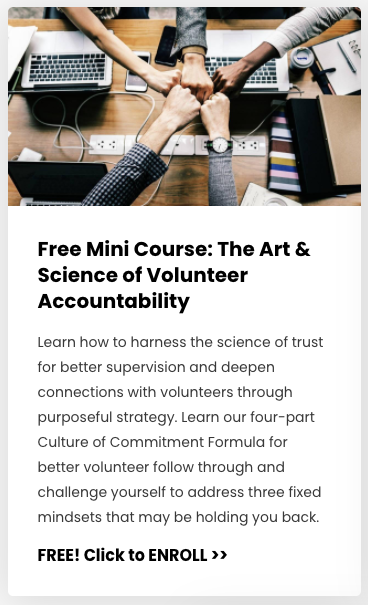
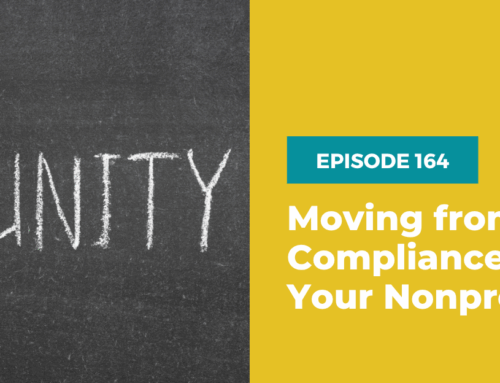

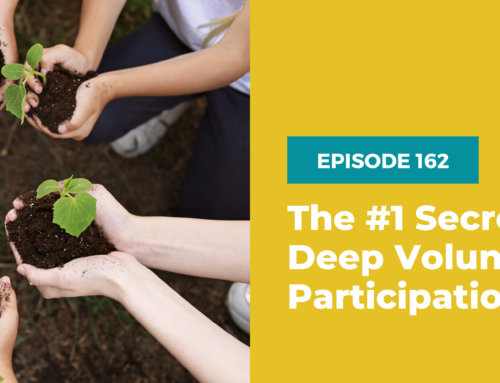
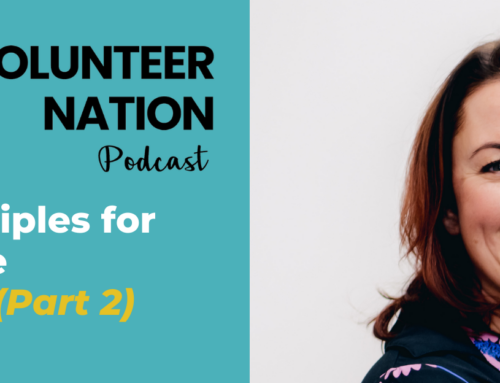

Leave A Comment